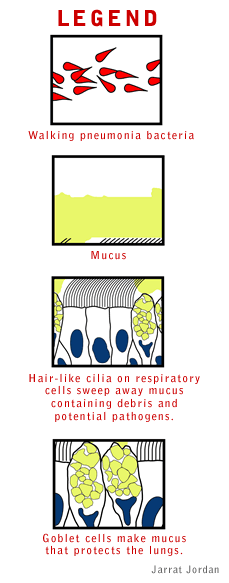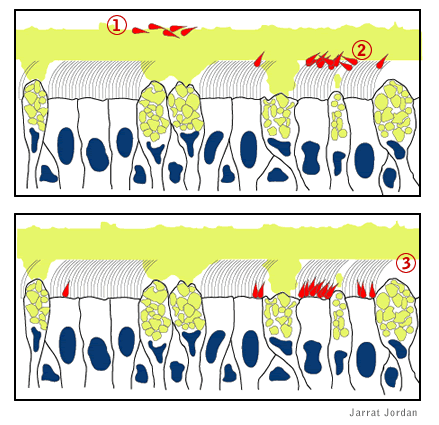


– Natasha M. Splaine


Meteors shot through the sky as Marie Thomas and her daughter lay on their backs, gazing up in wonder. But instead of remembering the grandeur of the Perseid meteor shower, Thomas would remember the evening for her hacking coughs as they shattered the quiet night. Thinking it was only a persistent cold, she had no way of knowing she actually had walking pneumonia. Nor could she have known that research by Jarrat Jordan, a UGA doctoral student, might one day help prevent the disease from ever getting a foothold in her lungs.
Working with Duncan Krause, professor and head of the microbiology department, Jordan studies one of the proteins that enable the pneumonia bug to attach to lung tissue in the first place.
“Our lab studies the proteins involved in attachment and how that attachment organelle functions,” Jordan said. “If you can’t attach to the respiratory cells, you won’t cause disease. So with this kind of work we can figure out ways to block attachment.”

(1) Most bacteria that enter the lungs are swept away in mucus. (2) Successful pathogens like the walking pneumonia bug swim through the mucus, past the beating cilia and (3) gain a foothold by attaching to cells that line the lungs.
No vaccine currently exists for walking pneumonia, which accounts for up to 30 percent of all pneumonia cases and afflicts an estimated two million Americans each year. Caused by the pathogen Mycoplasma pneumoniae, which is among the smallest and simplest subclasses of bacteria, the disease is accompanied by headache, fever, cough and sore throat.
And, like Thomas, many people don’t realize how ill they are until they finally see a physician.
“I assumed I just had a cold that was not getting better,” Thomas said of her bout with the disease. “I didn't know how sick I was until they put me on antibiotics and I started feeling better.”
Rather than trying to kill the organism with antibiotics, Jordan focuses on a specific protein, P30, in M. pneumoniae’s “attachment organelle” — a finger-like projection the pathogen uses to grab onto its victim’s respiratory tract.
“This protein is involved in a whole bunch of different functions,” he said.
At least one of those functions is crucial to the pathogen’s ability to cause disease: Cells that lack P30 don’t attach to the lung.
To understand how P30 is involved in attachment, Jordan “dissects” the protein by genetically altering it. After removing the gene that makes P30 from one M. pneumoniae, he modifies the gene, and then puts it into a mutant bacterium that lacks it. Then, when the mutant Mycoplasma makes the protein, it will be different. In this way, Jordan can determine the various functions of P30 with each mutation.
Besides its importance in attachment, Jordan’s lab has found that P30 is also required for movement of the bacterium, allowing these tiny organisms to glide along respiratory cells like a slug.
And movement may also be vital for infection.
“It has been thought that movement is needed by this bacterium to penetrate the mucous layer that protects respiratory cells, though there was never any way to test this,” said Jordan.
But now, thanks to a new mutant strain, there is a way. Jordan’s colleagues have discovered a mutant that maintained its ability to attach without being able to move. The importance of movement in infection can now be tested using these mutant bacteria.
“If we can figure out more about P30 and its functions, then we can know more about how the attachment organelle works and how these cells move, which could ultimately give us insight into possible vaccine candidates," Jordan said.
Recently, Jordan's research caught the eye of the Achievement Rewards for College Scientists (ARCS) Foundation, which provides scholarships for outstanding students in science, medicine, and engineering. Jordan is one of seven UGA graduate students to receive the scholarship this year.
For more information, email jarrat@uga.edu
For comments or for information please e-mail the editor: jbp@ovpr.uga.edu
To contact the webmaster please email: ovprweb@uga.edu
![]()